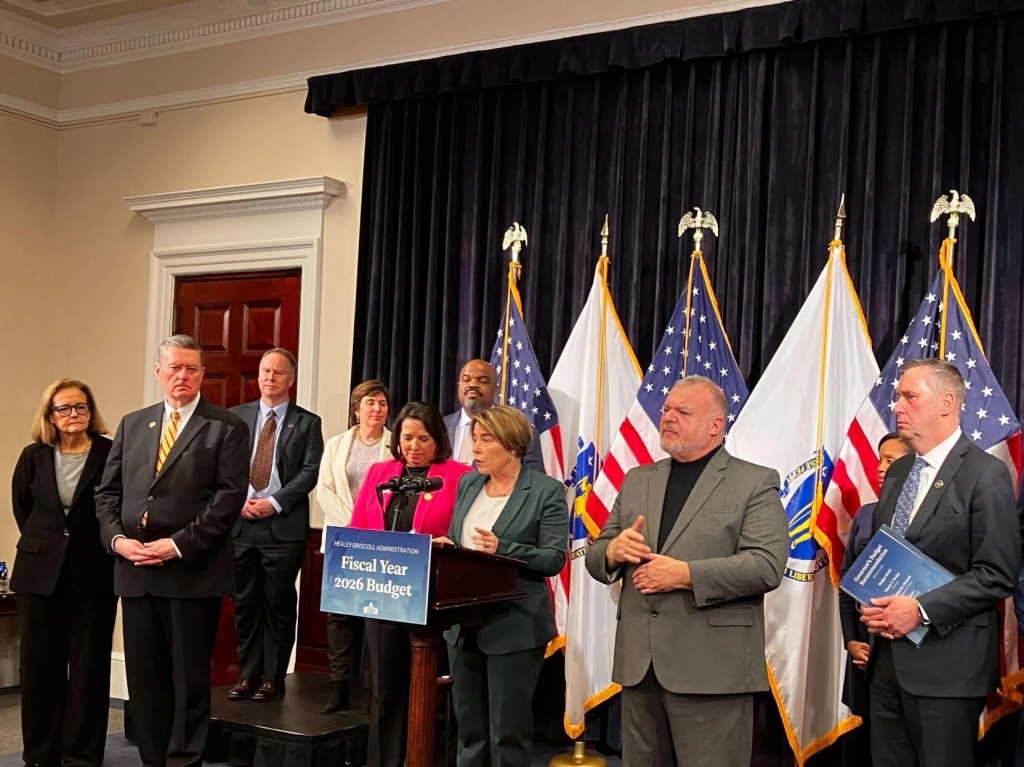By Colin A. Young – January 31, 2025
Massachusetts Governor Maura Healey has introduced a new version of her Municipal Empowerment Act, a proposal that would allow cities and towns to raise local taxes and gain more control over local policies. This bill, which the governor filed on Friday, comes after a version of the bill failed to make progress in the legislature last year.
The Municipal Empowerment Act is designed to help local governments better manage their budgets, support high-quality services, and make communities more attractive places to live and work. It includes a mix of tax proposals, policy changes, and new tools that local officials can use to improve services for residents.
Key Proposals in the Bill
One of the most notable aspects of this bill is the proposal to increase local taxes. The governor’s new bill would allow cities and towns to raise the local tax rates on meals, lodging, and vehicle registrations. For example, the local tax on hotel and rental prices could increase from 6% to 7%, with Boston’s rate possibly rising from 6.5% to 7.5%. Similarly, the local meal tax could go up from 0.75% to 1%.
The bill also introduces the possibility of adding a 5% surcharge on motor vehicle excise bills, with the additional revenue going toward local stabilization funds.
Revere Mayor Patrick Keefe Jr. expressed his support for the proposed tax changes, believing it would help his growing city fund vital services such as education, infrastructure, and community programs without overburdening homeowners. “Providing local options to grow revenue will allow Revere to position itself for the next generation,” he said.
In addition to the local tax provisions, the bill includes measures to improve local government operations and services. It would permanently authorize municipalities to hold hybrid meetings, allowing residents to attend town meetings both in person and remotely.

The bill also seeks to change state procurement laws, particularly around snow removal and hauling services. It proposes increasing the maximum bond term for school projects from 30 to 40 years and addresses long-standing issues around utility pole removal.
Governor Healey’s office says that this legislation is aimed at helping cities and towns reduce long-term fiscal pressures, attract a talented workforce, and provide better services to residents. “Every Massachusetts resident deserves to live in a community with high-quality local services,” Healey said in a statement. “We want to empower local officials to make the decisions that best serve their communities.”
What’s New in This Version of the Bill
This year’s version of the bill includes some changes from last year’s proposal. For example, it includes new language to protect local public safety officials and others who administer fentanyl test strips from criminal or civil liability.
The bill also proposes new property tax exemptions for seniors and other measures to streamline local government processes, such as creating Regional Boards of Assessors and easing school project borrowing procedures.
The bill no longer includes some provisions that were part of the original proposal, such as changes to public notice requirements for competitive bids and regulations around electronic school buses. These provisions were either dropped due to feedback or made law through other means in the past year.
Reaction from Lawmakers and Advocacy Groups
While many local officials support the bill, not everyone is on board with all of its proposals. Some advocacy groups, particularly those focused on open government and disability rights, have raised concerns about the hybrid meeting provisions.
They argue that giving municipalities discretion over offering remote meeting options could limit access for people with disabilities, elderly residents, and others who may not be able to attend in-person meetings.
The ACLU of Massachusetts, the Boston Center for Independent Living, and other groups have called for stronger guarantees for remote participation. They believe that access to public meetings is a fundamental civil right that should be protected for all residents, especially those who face barriers to in-person attendance.
Challenges Ahead for the Bill
In the previous legislative session, Governor Healey’s proposed bill was split into two parts: one focused on municipal issues, and the other on tax matters. Unfortunately, both parts failed to pass in the Ways and Means Committee during an election year when the cost of living was a major concern for many voters.
Despite the setbacks, Healey remains committed to finding ways to empower local governments to generate more revenue. “Those are local options,” Healey said in defense of her plan last year. “What we’ve heard from some communities is that they want more tools at their disposal to deal with some of the challenges they’re facing.”
For Healey, the local tax proposal is about giving municipalities the flexibility to make decisions that work for their communities. It’s not about increasing state taxes, she emphasized.
As the proposal moves through the legislature, it remains to be seen whether it will gain traction this time around. Lawmakers will need to weigh the benefits of giving local governments more control against the concerns raised by advocacy groups and other stakeholders.
Looking Ahead
Governor Healey’s bill is part of a broader effort to address Massachusetts’ fiscal challenges while making the state more competitive and affordable for residents. By proposing these changes, Healey hopes to give local governments the resources and tools they need to thrive in an increasingly complex and demanding environment.
As the bill works its way through the legislative process, residents and local officials will be watching closely to see if Massachusetts is on the path to greater municipal empowerment and sustainable growth.
Disclaimer: This article has been meticulously fact-checked by our team to ensure accuracy and uphold transparency. We strive to deliver trustworthy and dependable content to our readers.

